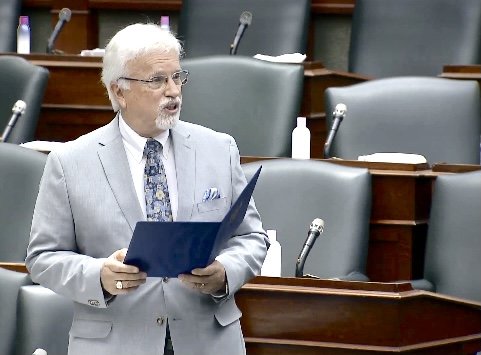TORONTO (LifeSiteNews) – Member of Provincial Parliament Rick Nicholls believes that a bill being considered in the Ontario Parliament could lead to undemocratic activity and the seizure of personal property without a warrant.
During the question period on April 4, Nicholls challenged Bill 100: Keeping Ontario Open for Business Act, which has so far gone through its second reading, opining that the intended scope of the bill could be used in ways that severely hamper the civil liberties of Ontarians.
The intention of the bill, according to the letter of the law, is to avoid any blockades of borders or critical infrastructure in the future by way of things like the Freedom Convoy protests that took place in February.
Bill 100 would allow for a number of things to be done to those found transgressing the bounds of the legislation, including arrest without warrant, surrender and suspension of driver’s licence and more.
The activities prohibited in the bill are not clearly defined; for example, “disrupting ordinary economic activity” is prohibited.
Nicholls said that although it may be “noble to prevent trucks from impeding critical infrastructure and trade routes,” he believes that the bill “goes much further.”
“The powers confirmed allow the seizure of all property including homes for far less than another convoy or blockade,” he said.
Bill 100 does not stipulate that property other than vehicles or things contained therein can be confiscated. However, the bill does state that it “makes complementary amendments to the Civil Remedies Act, 2001.”
The Civil Remedies Act does give the government the power to seize property and possessions as a means of making restitution to those who have had their own property lost or damages by criminal activity.
Bill 100 would make amendments to the Civil Remedies Act to include “injury to the public” as a reason for using the sweeping powers of the Act to confiscate the property of those found guilty. The amendment proposition defines injury to the public as:
- Any unreasonable interference with the public’s interest in the enjoyment of property.
- Any unreasonable interference with the public’s interest in questions of health, safety, comfort or convenience.
- Any expenses or increased expenses incurred by the public, including any expenses or increased expenses incurred by the Crown in right of Ontario, a municipal corporation or a public institution that belongs to a class prescribed by the regulations made under this Act.
This could mean that those found guilty – even without trial – of trespassing the bounds of legal protests done with vehicles could face penalties found within the Civil Remedies Act, which could include the seizure of all personal property.
Nicholls called the proposed amendment “unconscionable.”
Cara Zwibel, a lawyer for the Canadian Civil Liberties Association (CCLA), said that she disagrees with the scope of the legislation, saying it could be interpreted “quite broadly.”
She told CTV News Toronto, “I think what this does or has the potential to do is sort of remove from people’s arsenal some protest tactics.”
“There’s quite a bit of language in here, I think, that gives a lot of scope and a lot of opportunity for the exercise of discretion by police and that can be a dangerous thing.”

